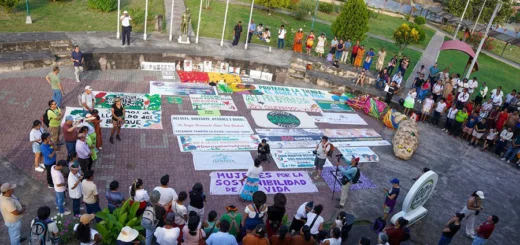Eight reasons to reject the controversial proposal to drill for oil and gas at the mouth of the Amazon River
The economist Marcos Arruda listed eight reasons to reject the proposal, which can bring serious environmental impacts to the region

The decision of the Brazilian Institute for the Environment and Renewable Natural Resources (Ibama) to deny drilling an oil well at the mouth of the Amazon River has become a clash between supporters and opponents of the Federal Government. Moreover, Petrobras project became the target of criticism from environmentalists inside and outside the Federal Government.
Ibama rejected the license to Petrobrás due to flaws in projects presented by the State company. With this, the preservation of the Amazon is once again at the center of the discussion. The economist Marcos Arruda listed eight reasons to reject the proposal, which can bring serious environmental impacts to the region.
- The hydrocarbon, or fossil fuel, sector is recognized as one of the main drivers of global warming. The energy sector in capitalism responds to an economy focused on unlimited growth of GDP and profit at any cost. The ideology of unlimited growth – or crescentism – demands unlimited growth of the energy matrix. This is what shapes the systems of transportation, logistics, and capital goods. It is also what adds fuel to the fire of human greed, which marks the current stage of the evolution of our species.
- The clamor of socio-environmental science is for humanity to begin the accelerated substitution of coal, oil and gas by renewable and clean sources of energy. This is what we call the transition of the energy matrix to sustainable, decentralized, renewable and clean forms of The planet has given insistent signals that it is necessary to halt and reduce greenhouse gas emissions to prevent the worsening of the effects of climate change, which is already accelerating exponentially.
- The successive international agreements resulting from negotiations among countries that participate in the COPs – Climate Conferences – result in proposals for atmospheric decarbonization targets by country. But these agreements have not presented satisfactory results. Most countries do not meet their targets, and a large part of the largest emitters refuse to reduce their emissions at the necessary pace to make feasible the 2100 world goal of an average temperature not higher than 1.5oC above the level of the beginning of the industrial revolution. The targets are not binding. The estimated threshold for the climate to enter a state of climate alert was 400ppm atmospheric CO2 By 2021 this CO2 concentration was already at 414.7 ppm, or 2.3 ppm more than in 2020. Despite the good intentions expressed in the emission targets of the countries that participate in the annual COPs, at the current rate of growth of GHG emissions, scientists predict that the Earth will have an average temperature of 3 to 4oC by 2100! All scenarios indicate catastrophic consequences for the planet and life if this happens.
- Objectively, Brazil does not need to explore for or extract oil or gas now. The Pre-Salt basins already guarantee reserves of 15 billion barrels, and the estimated potential of these basins reaches 70 to 100 billion barrels. Why, then, this unbridled “black gold rush”? Crescentism – the ideology of unlimited growth at any cost for immediate profit – assails the greed of the leaders of the mega oil companies and politicians from the three branches of government. Irony: they present more jobs, capture of royalties, and increase in the volume of oil and gas extracted and sold as factors of “sustainable development”. Nevertheless, what about the impacts of drilling and eventual extraction of these fuels on the forest populations, the climate, biodiversity and the delicate and already so depleted Amazon Biome?
- Block FZA-M-59, where Petrobrás intends to start the exploratory campaign in deep water, is more than 400 km from the mouth of the Amazon River. Petrobrás projects the well 160 km from the northern coast of Pará. Nevertheless, these distances are no guarantee of low risk, when it comes to climate change factors, especially in the coastal and marine region of the Amazon. There the salty and fresh waters mix, creating habitats for abundant aquatic life. There also pass immense volumes of water vapor that constitute the flying rivers responsible for the mild climate of the South American continent.
- The risks and threats of oil and gas exploration at the mouth of the Amazon River are innumerable. The context: the great distances concerning emergencies, the marine and air currents, the flying rivers that bathe a large part of South America in humidity. The biodiversity and regional anthropology: the ecosystems that make up the Amazon biome – native and riverine communities, coral reefs, the rich variety of river and marine species, the survival of the forest itself. The operative risk factors: an eventual spill could reach the coast, even neighboring countries; the increase in Brazilian GHG emissions; the opening of a new frontier with all the risks for human, social and environmental security in the region to be affected (see what is happening in Altamira, from the offensives of agribusiness and mining companies).
- Between April and May 2023 more than 80 civil society organizations and networks sent statements of support for IBAMA’s decision not to authorize drilling at the mouth of the Amazon River until the Environmental Assessment of Sedimentary Areas (AAAS), which involves multidisciplinary studies to identify potential social and environmental impacts of oil and gas exploration and extraction activities, is carried out. This assessment aims to contribute to the definition of the areas studied as suitable or not for the safe exploration and extraction of oil and natural gas.
- Therefore, the only reasonable policy from a strategic, economic, and socio-environmental point of view is to invest in the fastest transition from the fossil fuel paradigm to a truly sustainable energy matrix for Brazil. IBAMA’s technical opinion, contrary to the prospective drilling in the area of the mouth of the Amazon River, is correct and fulfills its mission. Petrobrás has the knowledge and resources to finance this transition. For this, we need to reconquer Petrobrás as a fully national public State company.
* By Marcos Arruda – Economist and educator, with a degree in Geology from the Federal University of Rio de Janeiro (UFRJ), collaborator of the Institute Alternative Policies for the Southern Cone (the PACS Institute), advisor to the Forum on Climate Change and Socio-Environmental Justice (FMCJS) and associate to the Transnational Institute (Amsterdam).
* Click here to read the portuguese version of this article.




